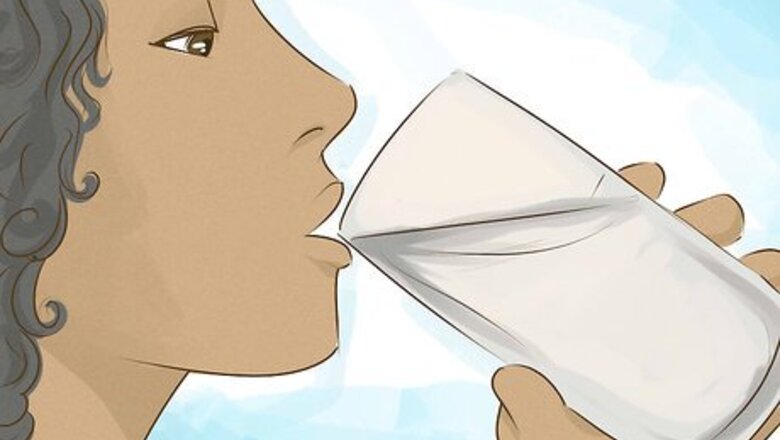
views
X
Trustworthy Source
Cleveland Clinic
Educational website from one of the world's leading hospitals
Go to source
and regular urination is important to keep your bladder healthy.[2]
X
Research source
Often, you can increase urination through rehydrating.[3]
X
Research source
In other cases, you may need medication or medical treatment. Contact a doctor immediately if you are having trouble urinating, have not urinated in 12 hours,[4]
X
Research source
experience pain while urinating, [5]
X
Research source
or have blood or dark brown urine. [6]
X
Research source
Staying Hydrated
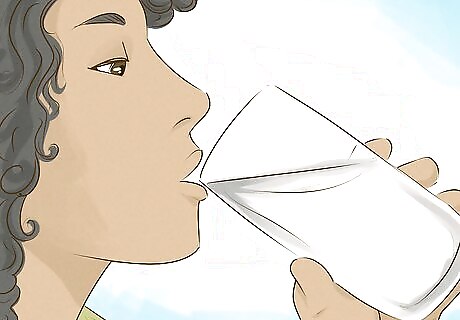
Drink plenty of water each day. Drinking more fluids is the best way to increase urination. Most people need about 2 litres (8.5 c) of water a day. Drink more if you sweat a lot, work out, or live in a hot climate. Water, juice, and tea count towards your fluids. If your urine is scarce and a dark yellow, you may be dehydrated. If you’re dehydrated due to vomiting or diarrhea, don’t drink fruit juice or soda. These can worsen the problem.
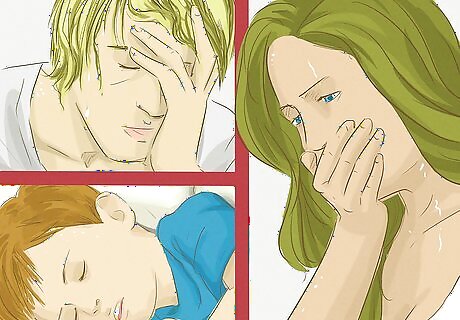
Keep an eye out for signs of dehydration. The most common cause of low urine output is dehydration. It’s also the problem that’s easiest to fix! You can easily become dehydrated if you’ve had diarrhea, been vomiting, or have a high fever. It’s also easy to get dehydrated if you sweat a lot while working out, or are in a hot environment. If you’re dehydrated, your urine will be dark yellow or you won’t urinate much at all. Recognize if you have other symptoms of dehydration so you can treat it appropriately: Dry lips, tongue, and mouth Feeling thirsty Fast or irregular heartbeat Dizziness, especially when going from sitting or lying to standing Feeling shaky, restless, or irritable
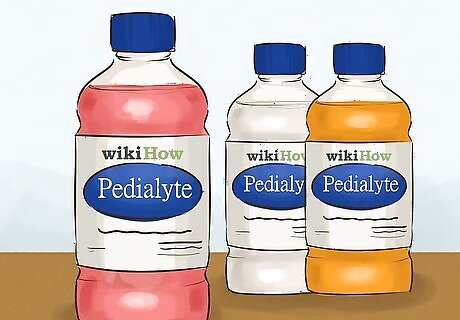
Give a hydrating solution to dehydrated children. If your child has low urine production due to dehydration, it’s important to rehydrate them right away. This can occur because of diarrhea, vomiting, or a high fever. Give the child a rehydrating solution like Pedialyte or Hydralyte. Give them 1 teaspoon (4.9 mL) every 1-5 minutes at first, and increase the amount gradually. Talk to your pediatrician before giving your child rehydrating drinks. Some require precise dosing. Use a syringe to give the solution to very young children. Older children can have diluted sports drinks to replenish fluids and electrolytes. Mix half Gatorade or other sports drink and half water. You may also provide ice chips to children using a cup and spoon.
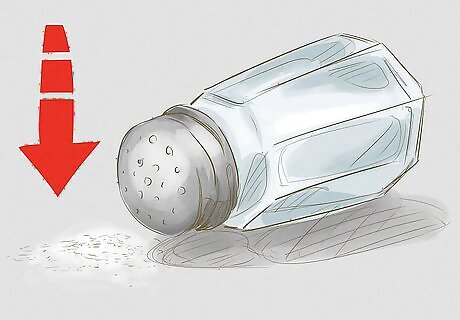
Minimize salt in your diet. Eating a high-salt diet can cause you to retain water, which limits how much you urinate. Reduce the amount of salt in your diet by avoiding fast food and processed food like chips and other snack-aisle items. Flavor your meals with herbs and spices instead of table salt.
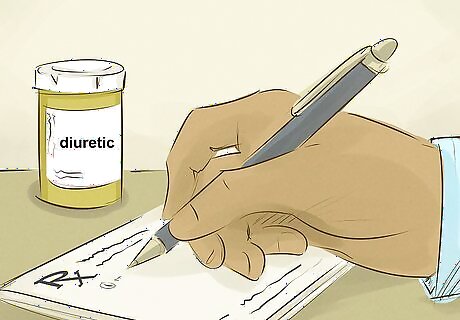
Take a diuretic to help yourself urinate. If you have a medical condition that makes your body hold onto extra water – like heart failure, for instance – your doctor can prescribe you a diuretic. That’s a medication that increases how much you urinate. Diuretics should only be used for specific conditions, so discuss your urinary trouble with your doctor and ask if a diuretic is right for you. Beverages containing caffeine and alcohol are natural diuretics.
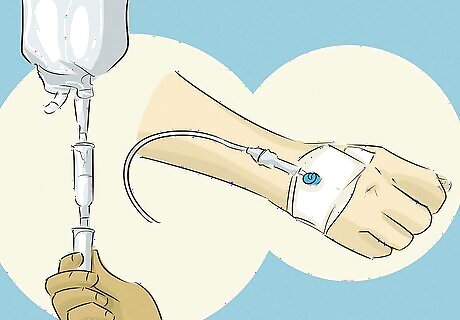
Get IV fluids. If you’re severely dehydrated, visit the emergency department for intravenous (IV) fluids. You’ll be given a saline solution through a needle into your vein. This is an effective way to get hydrated, and you will begin urinating more soon afterward. Signs of severe dehydration requiring IV fluids include: Not urinating at all for hours, or very dark yellow urine Dried up, shriveled skin Confusion or delirium (quick onset of confusion or hallucinations) Rapid breathing, fast heartbeat, or skipped heartbeats Severe fatigue or listlessness Unconsciousness Fever
Treating Medical Causes of Low Urine
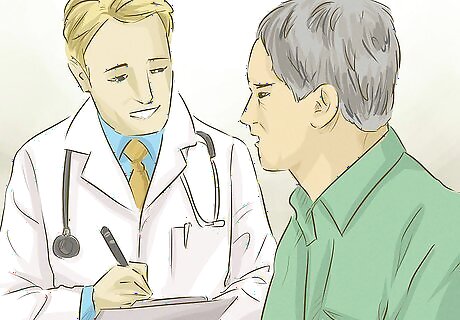
See your doctor for a urine test. Any time you’re having trouble urinating, visit your doctor. They can test your urine to see if you’re dehydrated or have an infection. Getting diagnosed is the first step to treating the problem.
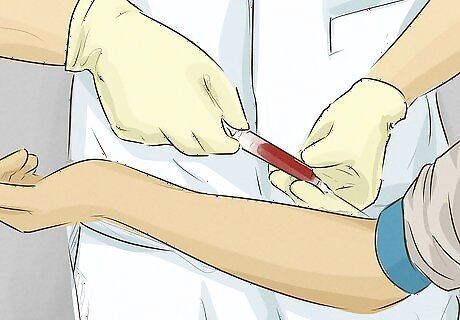
Have your kidney function checked. Sometimes if your kidneys aren’t working well, your body stops making urine or decreases how much urine is made. See your doctor right away for a kidney function test if you stop making much urine and have swelling in your legs, feel drowsy, confused, or fatigued, have chest pain, or experience shortness of breath. Your doctor can check your basic kidney function with a blood test. Kidney problems can be chronic (long-lasting) or acute (new and abrupt). Many illnesses can cause kidney problems, so see your doctor to get diagnosed and treated.
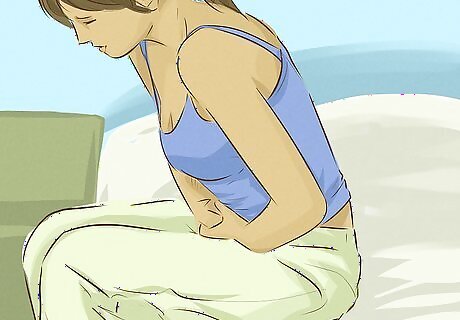
Visit your doctor if it burns when you urinate. Urinary tract infections, or UTIs, are more common in women than men, but both sexes can experience symptoms. UTIs can cause inflammation or swelling that blocks urine flow. Treatment is typically administered in the form of an antibiotic. Visit your doctor for treatment if you have symptoms of a UTI such as: A strong urge to urinate Burning or pain when you urinate Urinating often in small amounts, or having a weak flow Urine that looks cloudy, pink, red, or brown Pain in the center of your pelvis, back, or sides A strong smell to your urine
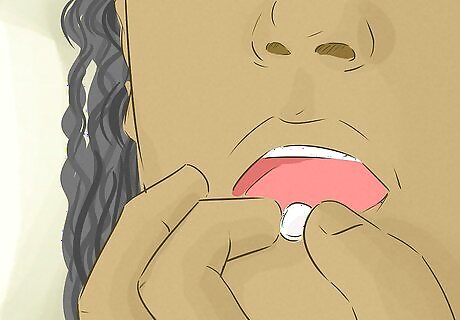
Get medical treatment for weak flow with groin pain. Prostatitis, inflammation of the prostate because of infection, is a cause of slow or weak urine flow in men. You usually also have pain in your groin or pelvis, and possibly chills or a fever. See your doctor to get checked if you have these symptoms associated with difficulty urinating. Prostatitis will be treated with antibiotics if it’s caused by a bacterial infection.
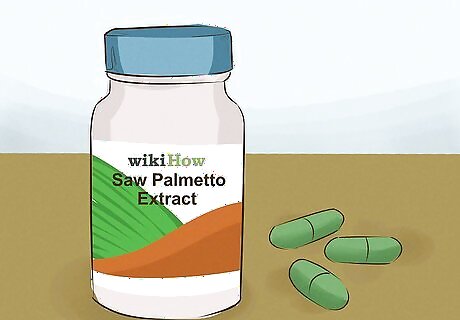
Manage your benign prostatic hyperplasia if you’re a man. Benign prostatic hyperplasia (BPH) commonly causes urinary problems in men over age 60. Your prostate enlarges and squeezes the urethra, blocking urine flow. If you have urinary trouble, see your doctor to be checked for BPH. Depending on how severe your symptoms are, your doctor can treat you with natural remedies like saw palmetto extract, medications called alpha-blockers, or surgical procedures. BPH is very common, but prostate cancer – though much less common – can also enlarge your prostate and cause urinary symptoms. It’s important to have your prostate checked regularly starting at age 50 (or earlier if a relative had prostate cancer). Treatment is often administered in the form of an antibiotic.
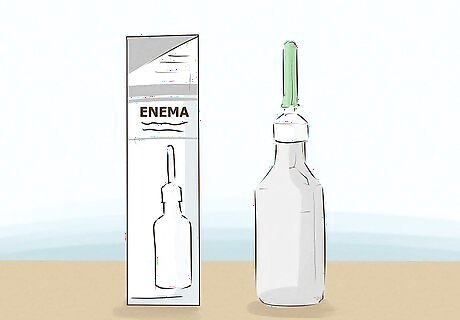
Treat your constipation if you’re having trouble urinating. Sometimes if you’re constipated a hard stool can push against your urethra or bladder and block urine from leaving your body. If you’re unable to urinate or have a weak flow and you’re also constipated, try to alleviate your constipation, then see if you can urinate freely. Drink extra water, eat prunes, and avoid dairy to try to alleviate constipation. ref>https://www.webmd.com/digestive-disorders/constipation-what-not-to-do Take an over-the-counter laxative like Miralax or Colace, or try a Fleet enema. Ask your doctor or pharmacist for suggestions.
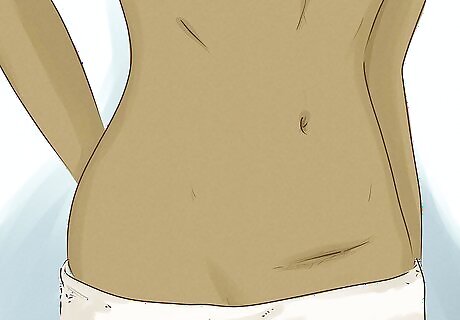
Get examined for scar tissue. If you’ve had past surgeries in the area of your lower abdomen, scar tissue may have formed. See your doctor for evaluation and discuss any illnesses, surgeries, or medical problems you have had with your bladder, kidneys, urethra, vagina, or prostate. Scar tissue or adhesion can sometimes be removed with minor surgery, which will allow for more room for urine flow. Scarred areas can also be open up with dilators, which stretch the area to allow urine to flow better. These procedures often need to be repeated over time.
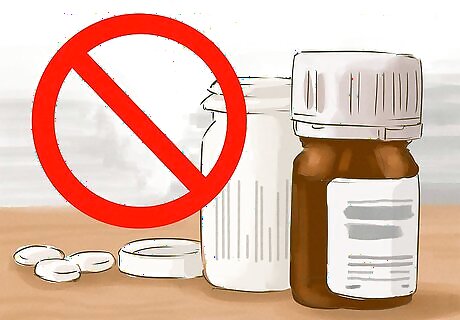
Stop medications that decrease urination. Stay away from antihistamines like Benadryl, and decongestants and stimulants like pseudoephedrine found in many cold medicines. Ingredients in these make it harder to urinate.
Physically Treating Your Pelvis and Bladder
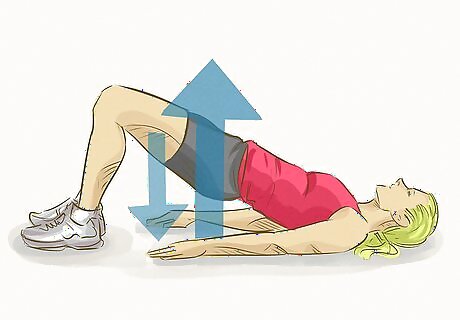
Do strengthening Kegel exercises. Women and men alike can benefit from doing kegel exercises, which strengthen the pelvic floor and improve continence and urinary flow. You can do Kegels anywhere, simply follow these instructions: While urinating, squeeze the muscles that stop your flow midstream – those are the muscles you want to isolate. You can do the exercise in any position. Tighten those muscles, hold for 5 seconds, then relax. Repeat this several times in a row. Gradually work up to holding the contraction for 10 seconds, then resting for 10 seconds. Try to do three sets of ten repetitions every day. Don’t squeeze other muscles like your abs, legs, or butt. Focus on flexing only your pelvic floor muscles.
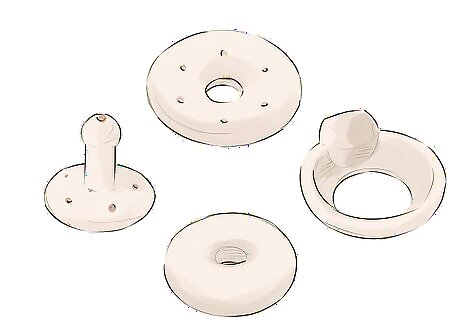
Support your bladder with a synthetic sling. Sometimes, vaginal childbirth or heavy coughing or straining can weaken the muscles that hold your bladder in place, causing your bladder to droop. This can affect how well you can urinate, and may be your problem if you have a feeling of fullness or pressure in your vagina or pelvis, it feels worse when you strain or bear down, you feel like your bladder isn’t fully empty after you urinate, you leak urine during intercourse, or you see or feel a bulge of tissue in your vagina. Ask your doctor about getting a pessary, which is a support for your bladder that sits inside your vagina. In severe cases, you can have surgery to reinforce your pelvic muscles and ligaments.
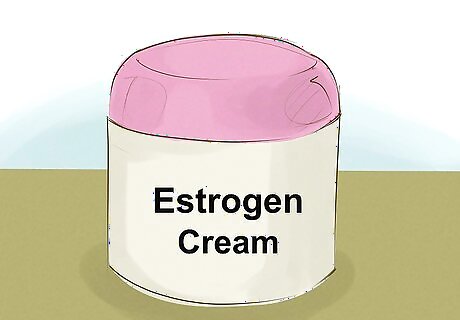
Use estrogen cream for postmenopausal urinary problems. Most women with leaking or weak stream experience the trouble after menopause – as estrogen decreases, skin and tissues thin and weaken. Using an estrogen cream that’s made for your vagina may help strengthen the surrounding skin and tissues. Ask your doctor or OB/GYN whether your urinary troubles might be helped with “topical” estrogen.
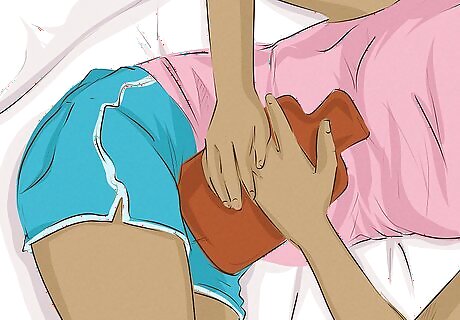
Use heat packs on your lower abdomen. Place a hot water bottle or heating pack on your low abdomen between your belly button and your pubic bone. Like with other muscles, the heat may relax your bladder and help you urinate more freely. You can also try taking a hot shower or soaking in a warm bath.
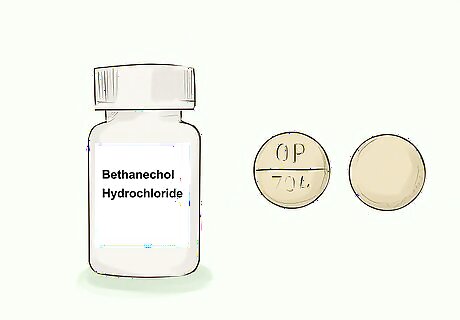
Discuss cholinergic medications with your doctor. Cholinergic medications increase how strongly your bladder contracts, which will help you urinate if your weak flow is due to nerve issues. Bethanechol hydrochloride (Urecholine) is usually prescribed, but can have many side effects, so talk to your doctor about whether it’s right for you. Ask your doctor questions about your condition, such as, “What is causing my urinary problems?” and, “What type of medicine will help? What are the possible side effects?”
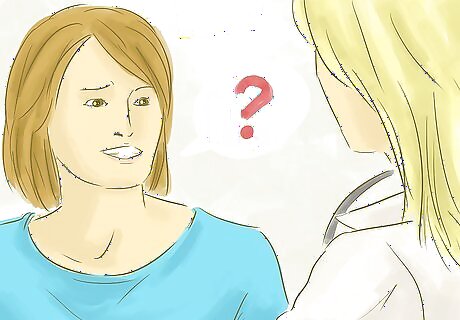
Get a catheter for emergency relief. In severe cases of urinary retention, you can ask your doctor about having a catheter placed inside your urethra and up into your bladder. This allows a clean, open passage for urine. This is meant as a short-term measure. Some people who have problems urinating due to nerve disorders may need permanent catheters.




















Comments
0 comment